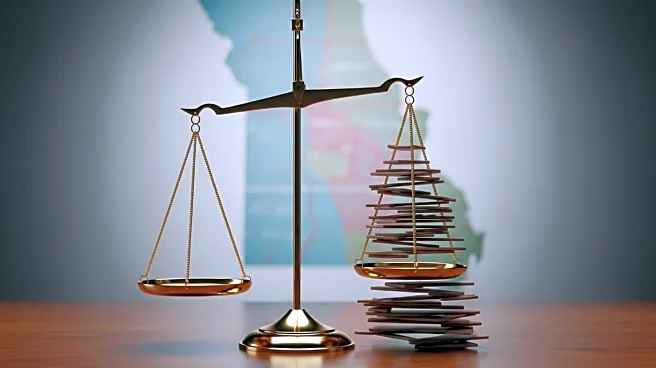What's Happening?
Missouri's Republican-dominated legislature has taken a significant step towards redrawing the state's congressional district map, aiming to secure an additional seat for the GOP. A legislative committee in the Missouri House approved the new map following a party-line vote, with all 10 Republican members supporting the measure and the four Democrats opposing it. The proposal, backed by Governor Mike Kehoe, is expected to be considered by the full House next week. The redistricting effort is likely to impact the district currently represented by Democratic Representative Emanuel Cleaver, which includes Kansas City. Cleaver has criticized the move as an unconstitutional attempt to disenfranchise Democratic voters.
Why It's Important?
The redistricting proposal in Missouri is part of a broader national trend where states are reshaping congressional maps to favor one political party. If successful, this effort could strengthen Republican control in Missouri, where they already hold six of the eight congressional seats. The potential shift in Cleaver's district could diminish Democratic representation in the area, affecting local policy priorities and voter engagement. This development underscores the ongoing battle over redistricting, which has significant implications for political power distribution and electoral outcomes across the United States.
What's Next?
The full Missouri House is expected to debate and vote on the redistricting proposal next week. If passed, the measure will likely face legal challenges from Democrats and civil rights groups who argue that the redistricting process is unfairly biased. The outcome of these proceedings could set precedents for similar efforts in other states, influencing the national political landscape ahead of upcoming elections. Stakeholders, including political leaders and advocacy groups, will closely monitor the situation, preparing for potential court battles and public campaigns to address the implications of the new map.
Beyond the Headlines
The redistricting effort in Missouri raises broader ethical and legal questions about the fairness and transparency of the process. Critics argue that gerrymandering undermines democratic principles by manipulating district boundaries to favor one party, potentially disenfranchising voters and skewing representation. This issue highlights the need for reform in how congressional maps are drawn, with calls for independent commissions to oversee the process and ensure equitable representation for all citizens.








